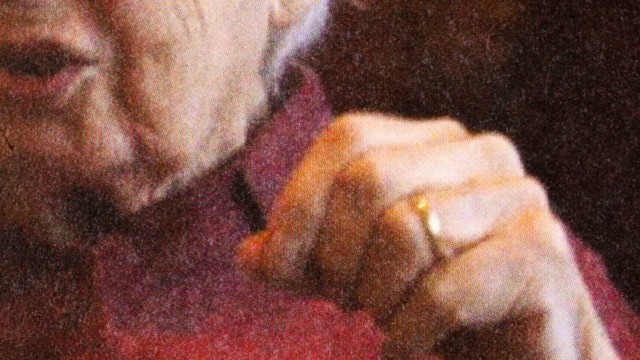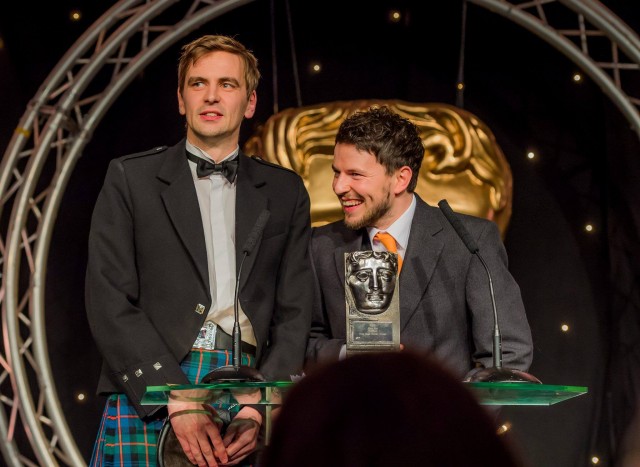Winner of awards from BAFTA Scotland, BFI Future Film Festival and Glasgow Short Film Festival, experimental animated doc Isabella is a short that hits the internet having already garnered a great deal of critical acclaim…and rightly so. An innovative film, with a great deal of heart, we grabbed its co-directors Ross Hogg and Duncan Cowles to talk about collaboration and filming family members.
Isabella is obviously a very personal film for you Ross, what inspired you to create such a short and how did Duncan become involved in the project?
ROSS: My grandmother, Isabella, had always taken pride in sharing stories and memories from her past with me. The memories normally shared a dark humour and were linked by a recurring theme of violence, which became all the more funny coming from a 91 year old Isabella, who was so small, frail and delicate.
Initially, I wanted to record some of these memories and adapt them in to a short, or series of short animated films. However, when I started the recording process, my gran’s symptoms of dementia and Parkinson’s Disease worsened resulting in momentary lapses where she would become confused about the present and forget important personal information entirely.
At other moments though she would respond with complete lucidity, remembering past memories very vividly. I felt my initial film concept had to adapt alongside the changes in Isabella’s condition in order to be truthful or to have any relevance. As she was coming to the end of her life, I felt it was important to capture and preserve her character at this sensitive time, as honestly and respectfully as possible. Therefore, the film was no longer solely about her stories, but also had to capture as much of her, and her condition, as possible.
As soon as I realised the film was beginning to take a different shape, or change from what I had initially expected, I spoke with Duncan about the idea and about my gran. I felt it was increasingly necessary to, not only record audio of my gran’s stories, but to have her on-screen at some point too. Duncan’s a good friend and I’ve been a big fan of his documentaries over the last few years – some of which have dealt with sensitive family subjects in a really empathetic way – so it became clear to me that we should collaborate and co-direct the film, in order to get a result which would portray Isabella honestly.
DUNCAN: I’d just finished my short film Directed by Tweedie when Ross approached me about doing a film about his Gran that fused live-action and animation in some way. I was looking to explore and collaborate on a new project and Isabella felt like a good opportunity to do something completely different to what I’d made previously, and work with someone who was already a good friend. Plus, having now made films on all of my family members already, I was in need of someone else’s to move onto…

What were you both personally looking to achieve with the creation of Isabella?
ROSS: Mostly answered in the previous question. Largely for personal reasons to capture a memory of Gran whilst this was still possible.
DUNCAN: To help Ross as a friend but also to move away from filming my own family, and indeed prove to many people that this was possible. Trying a new approach and collaboration would push my filmmaking forward.
I also wanted to create something different that nobody has seen before. When stripped back, we were essentially filming someone sitting in a chair telling a story. For me the challenge was making that as cinematic, creative and universal as possible, whilst working to the constraints we were given.
It took us about a year to make the film, which is a long time considering the actual filming itself basically was mostly done in one day, with an additional research shoot prior to that. The film was really made in the editing room, when we began playing with animation and sound design. That’s what took the time.
“Her response was “I think I looked beautiful”. That was probably the best feedback I could have gotten”
Ross, have your family seen the film and what did they think about it?
“It worked well because it bounced us both out of our comfort zones”
How was the film made?
ROSS: The style of the film is very much mixed media. There’s a mix of some quite experimental live action footage (using free-lensing), some more traditional documentary footage, some ink animation, some digital animation, and animated segments of Isabella’s brain scans. The aim, I suppose, was to try and create an environment capable of immersing the viewer into the disjointed, at times confusing, world of 92 year old Isabella.
DUNCAN: We knew from the outset that it was going to be experimental, and I wouldn’t say we were entirely sure how it was going to work when beginning the film. I had some ideas that I wanted to try out when filming, and some thoughts about how it might fit together, but I don’t think we really knew until we started editing and began to form a structure and try new techniques out.
We were always going to split it so Ross would handle the animation, I would deal with the camera, and we would both kind of be across everything else, both asking questions, editing etc… I think it worked well because it bounced us both out of our comfort zones.
At first I was quite concerned about the animation because it was new for me, and I’m more used to looking for ways to tell the story without animation. Ross was the same with the live-action element. I remember us both sitting there editing together and talking about how unsettling it was at first, but that has been important for me in moving forward with my work and thinking about how I will make films in the future. I want to make sure I push myself outside my comfort zone with every project moving forward. Otherwise there’s no point.

Photo taken at BAFTA Scotland Awards | by Alan Peebles/BAFTA
What did you learn from collaborator with each other and how do you think it will influence your filmmaking going forward?
For example I think already, not so much with the care home films I’ve just made, but with my new short Alexithymia, there are some direct influences from having made Isabella. The bold experimental style choices within it are probably ones I wouldn’t necessarily have confidently used previously. Although it’s impossible to track where every directorial decision stems from, but aye, I reckon there are strong influences from working with Ross on Isabella in there.
Oddly through co-directing, the whole process of working with not just your own, but someone else’s vision and style, sort of makes your own personal directing and filmmaker style show more clearly than it might otherwise have? So in moving forward, you sort of ‘know yourself’ even more than before. I think… Does that makes sense? Probably not. My English skills are terrible.
What are you working on now?
DUNCAN: I’ve now just finished another short film called Alexithymia, and I’m also working on the development of my first feature documentary film, which has received some early support from the BFI & Creative Scotland.
Keep an eye on my twitter & Production Company website for more updates on that: I will also be releasing a short doc series based on my previous short Directed by Tweedie, but filmed with residents of a care home soon.
ROSS: I’ve just completed a new short film called Life Cycles which is currently touring film festivals. He has also just received support from Creative Scotland to research and develop a piece of immersive animation intended for gallery exhibition.
 Rob Munday
Rob Munday